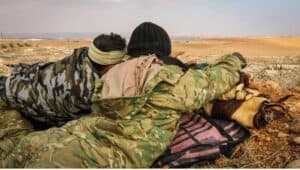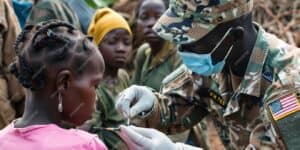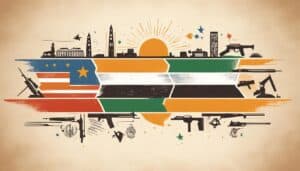Coalition in Mali, Burkina Faso, Niger: Latest Updates
More than 12,000 people died in the Central Sahel region in 2023.1 Many of them were innocent civilians.
This shocking number shows the serious security problem there. Groups linked to al-Qaeda and ISIS have been attacking people.1 This has led to a lot of violence against the local communities.
Even with the Alliance of Sahel States, made up of Mali, Burkina Faso, and Niger, things are not getting better.1
The security issue is getting worse. There’s also a lot of political chaos and violations of human rights.
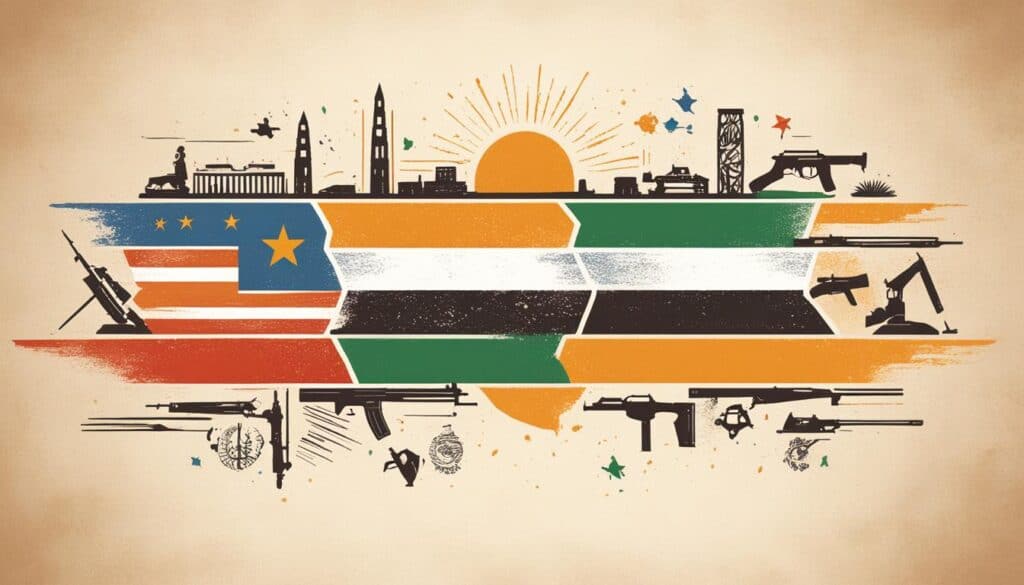
Key Takeaways
- Over 12,000 civilians killed in the Central Sahel region in 20231
- More than 3 million people internally displaced, with over 2.1 million in Burkina Faso alone1
- Armed Islamist groups committing war crimes, including sieges and attacks on civilian infrastructure1
- National militaries and allied mercenary forces implicated in possible war crimes and crimes against humanity1
- Withdrawal of UN peacekeeping mission leaves gaps in human rights monitoring and civilian protection1
Escalating Violence and Militant Threats in the Central Sahel
The Central Sahel Region, which includes Mali, Burkina Faso, and Niger, has been in crisis since the 1960s.2
This area is critical for migrants heading to Europe. It has faced serious violence and human disaster in places like Liptako-Gourma and Lake Chad Basin.2
Armed Islamist Groups Perpetrating Atrocities
Al-Qaeda and Islamic State linked groups have been committing heinous acts against people in the Central Sahel.
They use tactics that might be war crimes or crimes against humanity.2 These include sieges, kidnappings, and planting explosives.
Their aim is to control routes and expand their power.2 Amnesty International says these groups have besieged around 46 areas.
They’re accused of destroying key civilian sites like places of worship and food stores. This has caused widespread damage and hardships.2
Security Operations Leading to Human Rights Violations
Counterterrorism efforts also have their dark side. They’ve led to alleged war crimes, including killings, sexual assault, and torture of innocent people.2
The area has seen a lot of political turmoil, with several coups. This has forced Mali, Burkina Faso, and Niger to form a defensive alliance.
The United Nations’ peacekeeping mission in Mali is also gone, leaving a gap in protecting civilians and human rights.
Political Upheaval and Security Challenges
In the past few years, many countries in the region have seen major political changes. Mali2, Burkina Faso2, and Niger2 all saw military coups.
These events broke down important alliances like the G5 Sahel force supported by France and ECOWAS.
Military Coups and Breakdown of Regional Alliances
Between 1960 and 2022, Chad, Burkina Faso, Mali, Mauritania, and Niger experienced twenty-five coups2.
The region’s security efforts, including groups like the G5 Sahel and ECOWAS, have been hurt by these military overthrows.
Formation of the Alliance of Sahel States
After the collapse of some regional alliances, Burkina Faso, Mali, and Niger joined forces. They formed the Alliance of Sahel States in 2023.
This group agreed to a defense pact and decided to leave ECOWAS in January 20241. Their goal is to better work against terrorism together.
The Alliance of Sahel States met on May 17 to finalize their plans3. This shows a big change in the region’s actions.
The countries are moving to a stronger strategy to handle their security issues.
Coalition in Mali, Burkina Faso, and Niger: Recent Developments
Even with the Alliance of Sahel States, security problems persist in Mali, Burkina Faso, and Niger. These include more harm to civilians and a rising need for aid.4
Originally a group of five, the G5 Sahel lost three members on Dec. 6. Mali, Burkina Faso, and Niger left, leaving only Chad and Mauritania.4
Increasing Civilian Casualties and Humanitarian Crisis
The area sees airstrikes that harm civilians from local and foreign forces. People have died in attacks on weddings and funerals, even from drone strikes.4
Russia gave Burkina Faso 25,000 tons of grains and sent 100 soldiers to help after an event on Jan. 25.4
Aerial Attacks and Indiscriminate Violence
After a summit in July 2023, Russia aims to provide more goods to Mali. These include wheat, fertilizer, and fuel.4
In late January, Niger’s Prime Minister went to Iran. They signed deals to grow their partnership in economy, politics, and health.4
Renewed Clashes between Malian Forces and Separatist Groups
From 2020 to 2022, Mali and Burkina Faso cut military ties with France. Troops from both countries left Mali and Burkina Faso soon after.4
With ECOWAS support, critics say the actions of the AES go against fighting imperialism. Many in the Sahel region support this move.4
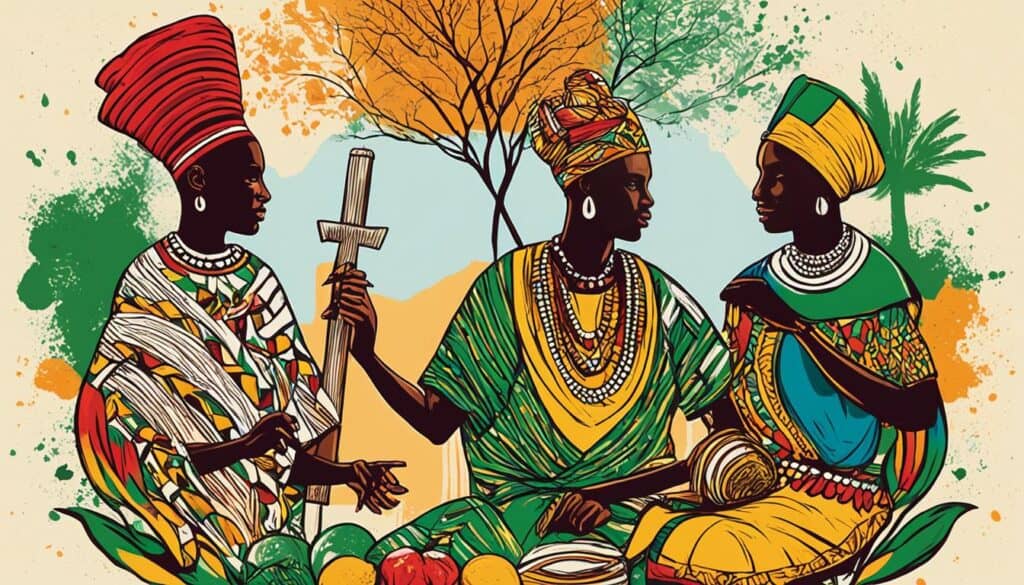
Conclusion
The Central Sahel area is still very dangerous, with more than 12,000 people killed in 20231. These were mostly civilians.
Over 3 million people are now away from their homes, with Burkina Faso hosting over 2.1 million of them1.
Armed groups are causing chaos in 46 places and have done terrible things, like war crimes, reports Amnesty International1.
The Malian Armed Forces and others have been accused of war crimes. This includes killing people without trials, rape, and torturing civilians1.
The Sahel States have come together as the Alliance but left groups like ECOWAS recently1.
The region still faces big challenges, like weak government and open borders. The number of displaced people in Burkina Faso jumped from 80,000 in 2018 to 486,000 in 20195.
In Mali, attacks by extremists went up from 180 in 2017 to almost 800 in 20195.
We need to act fast to stop the conflict’s main causes and keep people safe. France is leading countries in cutting off terrorist money6.
The Sahel Alliance is working on creating jobs, teaching, and improving services in the area6. Yet, we must do more to bring peace and end the violence cycle.
Source Links
- https://www.globalr2p.org/countries/mali/
- https://www.cfr.org/global-conflict-tracker/conflict/violent-extremism-sahel
- https://www.crisisgroup.org/africa/sahel/mali
- https://www.liberationnews.org/mali-burkina-faso-and-niger-leave-ecowas-what-moves-are-being-made-in-the-region/
- https://www.csis.org/analysis/politics-heart-crisis-sahel
- https://www.diplomatie.gouv.fr/en/french-foreign-policy/security-disarmament-and-non-proliferation/terrorism-france-s-international-action/
